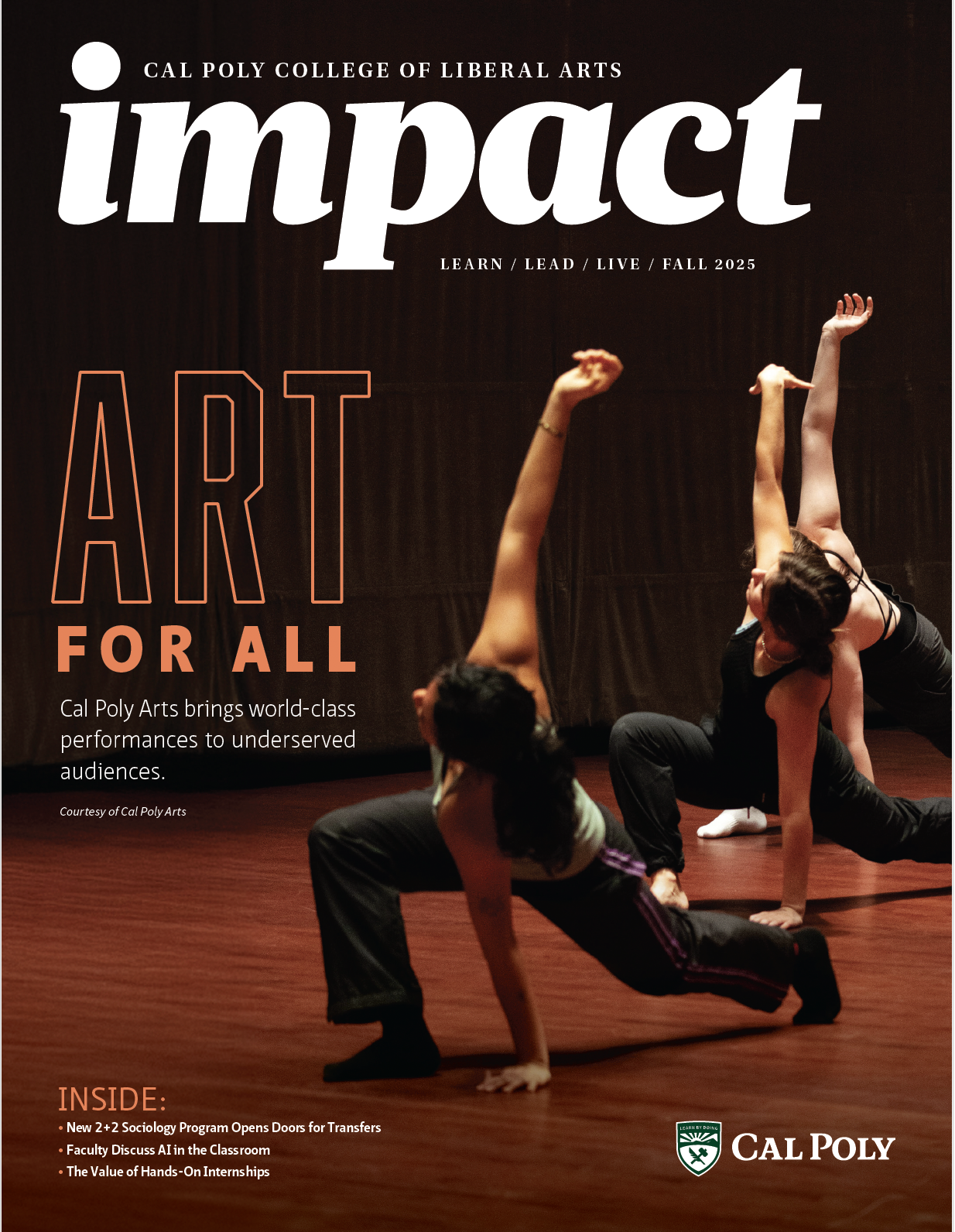Cal Poly Hackathon Awards Top Prize to Mental Health Application

Team Optimist, from left, Hannah Giorgi, Alyssa Wigant and Miranda
Pickett, Jacob Johannesen and Cory Mayer and Johnson Zhou.
Photo: Jay Thompson, Cal Poly
A team of six Cal Poly students received $2,500 and four iPad tablets for their mobile mental health application as top prize winner at Cal Poly Center for Innovation and Entrepreneurship’s 2nd annual Design and Dev Hackathon.
More than $7,500 in prizes were awarded at the event,held Jan. 30-31 on campus.
The winning Optimist software application “started with a simple idea: to create an app that would not only make stressed students feel better but to also make mental health a more common topic of conversation,” said Alyssa Wigant, a graphic communication major who came up with the concept.
“Optimist accomplishes this by making the process of finding optimism fun, using virtual geocaching to search for and unlock messages around you on a map,” Wigant said.
Wigant’s team included: graphic communication majors Hannah Giorgi and Miranda Pickett; Cory Mayer and Johnson Zhou, who are studying computer engineering; and computer science major Jacob Johannesen.
“Hackathon is for any Cal Poly student but specifically designers and developers to spend 12 hours hacking away at any sort of idea that they have,” said Chelsea Brown, manager of Student Innovation Programs at the university’s Center for Innovation and Entrepreneurship, which co-sponsored the event with the Creative Media Development student club.
“That could be building a mobile application, it could be building a web application like a website. Essentially it’s just a fun way for students to engage in entrepreneurship for 12 hours on a Saturday. It’s not about the business model; it’s about what you design, what you develop and how it works.”
Ideas were not judged on business viability, which was the subject of the center’s annual Startup Weekend SLO held earlier in January, Brown said.
Hackathon attracted about 130 participants, from all of the university’s six colleges, who formed 18 teams that worked against the clock to design and develop ideas. Concepts included an app offering dating ideas and locations, a money transfer application, and a social media app to share rental housing ratings.
It was a valuable experience for all participants, said Lorraine Donegan, a graphic communication professor and faculty coordinator who also organized the 2014 Hackathon.
“It reinforces the notion that collaboration between disciplines is essential,” she said. “More than 100 students came to the kickoff with an idea and their skillset. They pitched ideas and formed teams, and within 24 hours their idea turned into reality or in many cases a viable product. Now, that’s a great experience.”
Optimist won the $2,000 grand prize from TransUnion, an international credit information and information management services company, and Apple’s Best Swift (programming) Prize, worth $500 and the four iPads.
Other prize winners were:
- LemonAid ($1,000), an application that connects volunteers to organizations near them.
- Pizza Club ($1,000), a mobile web app that alerts students to free food offerings on campus while encouraging users to go to clubs they might have disregarded. The idea won the Hackathon’s Gold Award for Best Design.
- Team Skittles ($1,000), a game featuring Marshawn Lynch, the media-averse Seattle Seahawks running back, dodging microphones to win Skittles, the candy he snacks on during games.
- Dweller ($500), a tool to help a user find a place to live. It uses specific preferences and mutual Facebook friends to ensure a compatible roommate match.
- Festy ($500) a web app to expose event goers to artists at major concert festivals, such as the Coachella Valley Music and Arts Annual Festival, that feature many events at different locations. The site will list every artist attending a festival with music samples, bios, and links to social media.
- Capeesh ($500), an app that monitors student comprehension in real time and pushes data to a web application.
- Pic-Toss ($500), a photo-sharing application to send an image to a friend who can edit and share or return it.
“If it weren’t for the Hackathon, there would be no Optimist,” Wigant said after the event. “Through the Hackathon, I was able to build a wonderful team of three designers, including myself, and three developers, who collaborated to figure out the best way to build our app.
“The Hackathon also held a helpful workshop that taught me how to successfully pitch our product in three minutes for the judges.”
The panel of local judges included three Cal Poly alumni: Tyler Smith, a partner at Refresh Media and creator of FlexSlider; Noah Stokes, partner at Bold, a web and mobile application studio; andJenny Michelfelder, a 2013 Cal Poly art alumnus. Other judges were Tony Gines, director of user-experience engineering and user-interface design at iFixit, and Jeff Hokit, user-experience director at Rocket Communications. Stokes also gave the keynote address.
Students were also able to benefit from about 20 industry mentors on hand during the weekend.
Wigant said her group intends to “to finish developing the app to use at Cal Poly and eventually other universities in partnership with their Health and Counseling centers.”
The SLO HotHouse, as well as the Center for Innovation and Entrepreneurship’s Hatchery Program, which help participants advance a business from concept to launch, “are definite possibilities,” she said.




